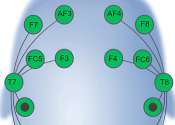Two key brain systems are central to psychosis, study finds
Inside the brains of people with psychosis, two key systems are malfunctioning: a "filter" that directs attention toward important external events and internal thoughts, and a "predictor" composed of pathways that anticipate ...
Apr 11, 2024
0
95









